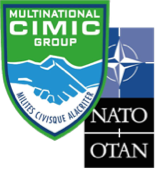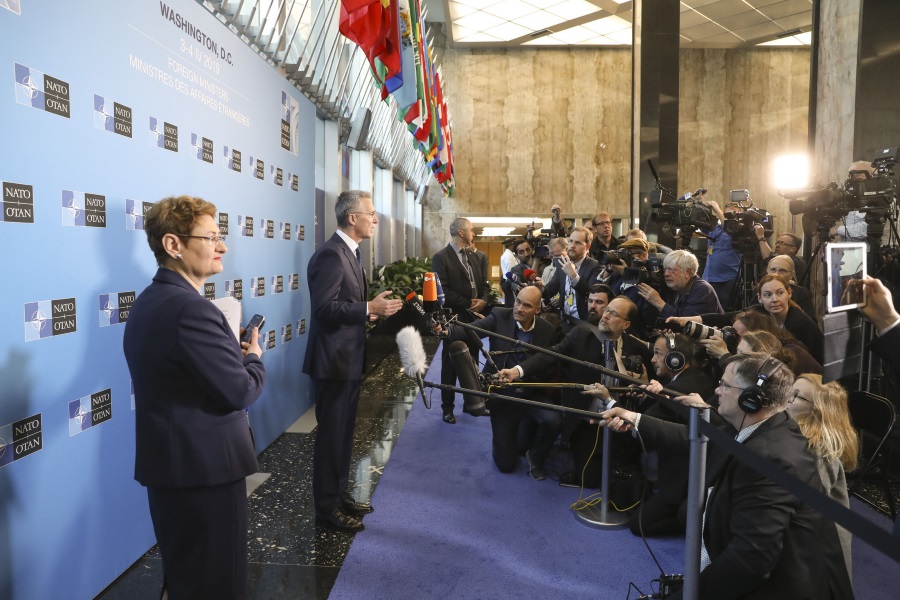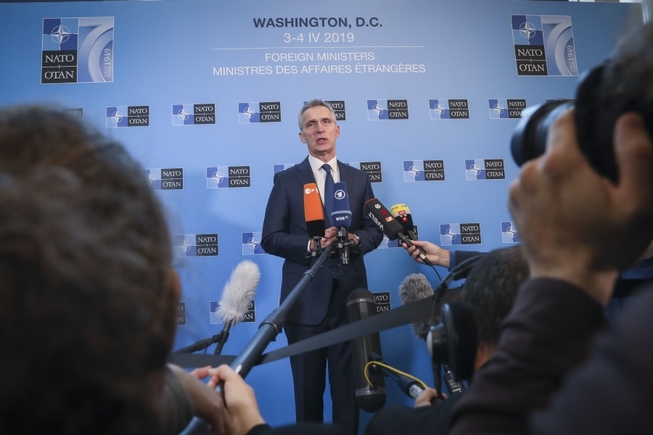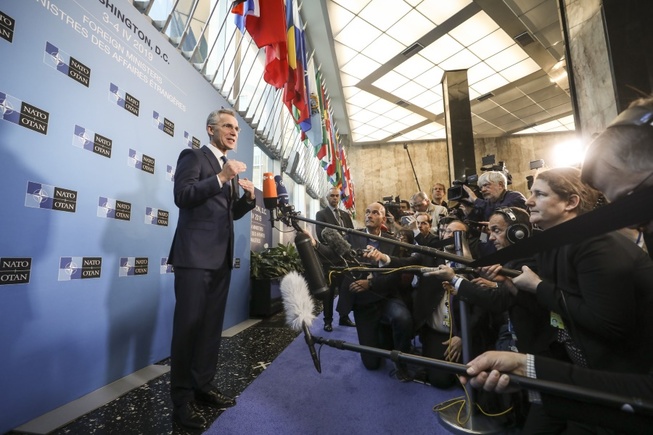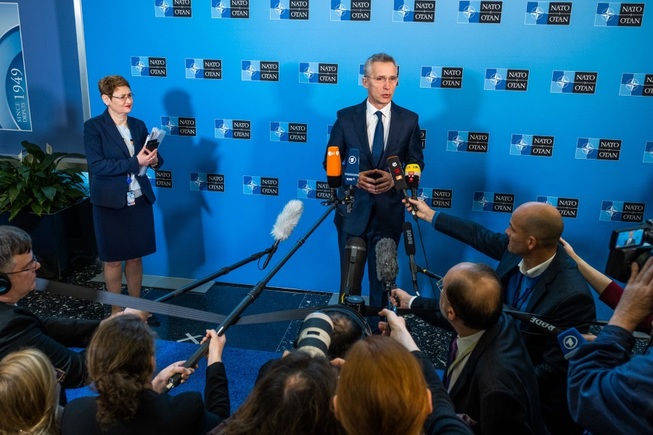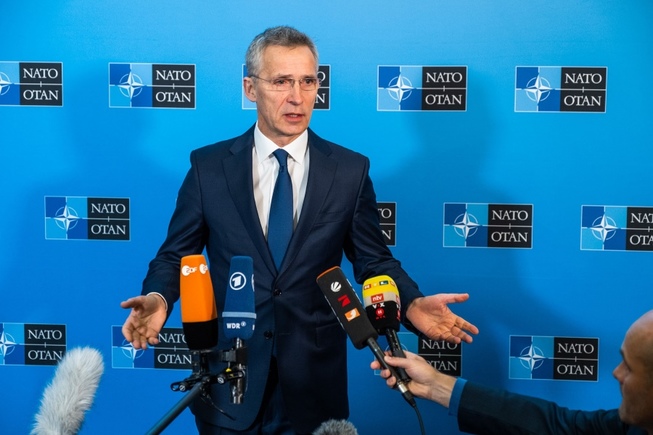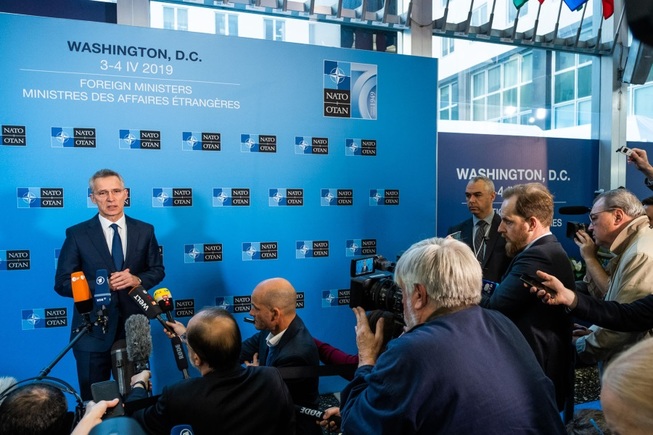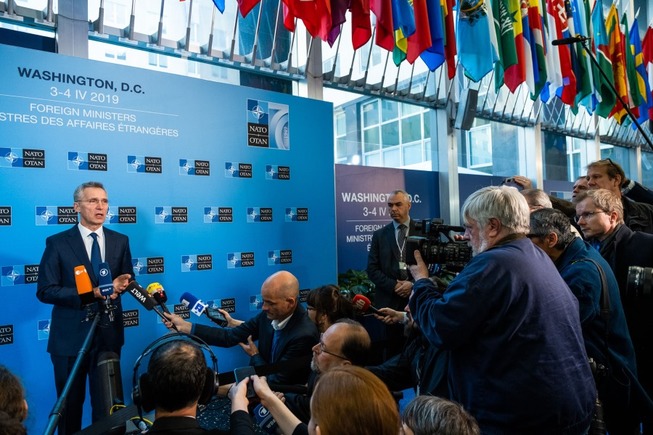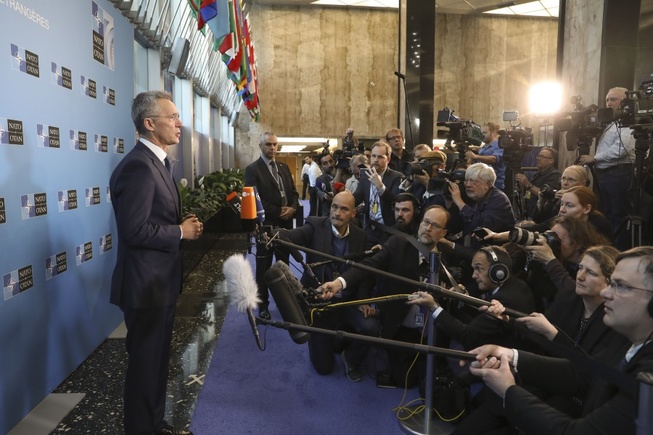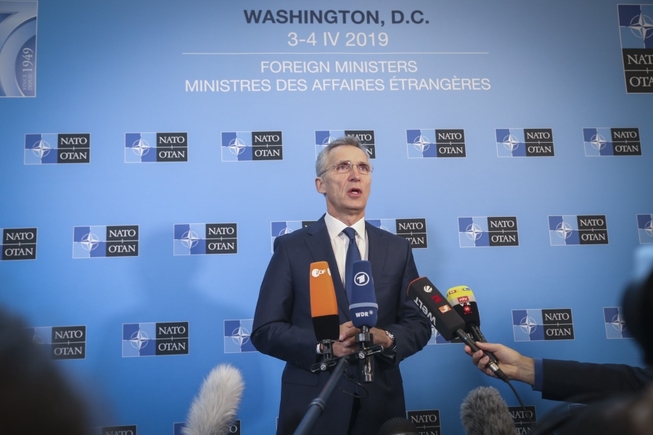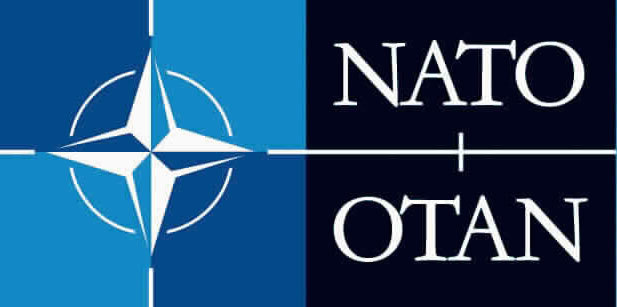NATO at 70: Secretary General Statement
by NATO Secretary General Jens Stoltenberg ahead of the meeting of NATO Foreign Ministers
Good morning.
It is a great honour to be in Washington today, because on this day 70 years ago, NATO’s founding treaty was signed in this great city. And since then NATO has preserved peace and safeguarded freedom.
NATO is not only the longest lasting Alliance in history, but NATO is the most successful Alliance in history.
We will during our foreign ministers meeting today of course reflect on our achievements over these 7 decades but we will also look to the future.
We will address important issues such as burden sharing and the importance of having a fair Alliance. And the good news is that we are making progress. Allies are stepping up and they do more together now than they have done for many decades.
We will also assess NATO’s role in the fight against terrorism. Secretary Pompeo will update us on the peace negotiations. And all NATO Allies strongly support the efforts to find a negotiated peaceful solution to the conflict in Afghanistan, to the war in Afghanistan.
NATO is also stepping up its efforts in the fight against terrorism with increased efforts when it comes to training of Iraqi forces. Prevention is better than intervention. We need to build local capacity to make sure that ISIS does not return.
And then we will address our relationship with Russia. Russia violates the INF Treaty by deploying new nuclear capable missiles in Europe. And we will also address the aggressive actions of Russia in the Black Sea region. We will agree on new measures of support for our close partners, Georgia and Ukraine, sovereign nations with the sovereign right to choose their own path.
And with that I am ready to take your questions.
QUESTION: Vice President Pence has criticised Germany for not spending enough money. Do you share his view?
SECRETARY GENERAL: So all NATO Allies made a pledge to invest more in defence, to improve burden-sharing in our Alliance. And and I expect all Allies, including Germany of course, to make good on the pledge we made together.
We didn't make this pledge to please the United States, we made it because we live in a more unpredictable and more uncertain world. Allies reduced defence spending after the end of the Cold War when tensions went down, but now tensions are going up again and we have to invest more in defence.
Germany as all other Allies are now making progress. The good news is that after years of cutting defence spending, Germany and all other Allies are adding billions to their defence budgets. So I welcome the progress we have seen, increased investments from Germany, but of course I expect more from all Allies.
Then, let me add that burden sharing is not only about spending. Burden sharing is also about contributions to different NATO missions and operations. Germany is a lead nation in Afghanistan, has been there for many years. Germany leads one of our battlegroups in the eastern part of the Alliance, in Lithuania. And Germany is also now responsible for our high-readiness force in NATO, and Germany is also leading the NATO activity in the Aegean Sea.
QUESTION: Do you see any resolution to the dispute with Turkey, on its plans to buy a Russian missile defence system, or is NATO going to have to live with what the Turkish Foreign Minister says is a done deal?
SECRETARY GENERAL: It's a national decision for each NATO Ally to decide on procurement of capabilities. But at the same time, we see that this is now an issue that has created disagreement between Allies. And NATO provides a platform for Allies to address issues like this. The S-400 issue is not on the agenda of the meeting today, but I expect of course this to be addressed on the margins of the meeting, because NATO is a platform for Allies to discuss issues like this.
NATO provides support to Turkey. We augment the air defence of Turkey with the deployment of NATO Patriot batteries. Spain, on behalf of NATO, has deployed Patriot batteries to Turkey. And also Italy has deployed something called SAMP/T, air defence system to Turkey. So NATO provides support, we augment the air defences of Turkey already, but of course I expect also this issue to be discussed on the margins of the meeting.
QUESTION: [inaudible]… Had to be 4 percent?
SECRETARY GENERAL: Well, we have made our decision, all Allies have agreed to a pledge. And I expect Allies to deliver on what we have agreed to. And the good news is that we are now moving in the right direction. Since 2016, European Allies and Canada have added 41 billion to their defence budgets already, and by the end of next year, that number will be 100 billion more for defence. So this makes a difference, and I welcome the increase we have seen.
QUESTION: Do you see any chance to save the INF?
SECRETARY GENERAL: It is still possible for Russia to come back into compliance. Because the period for finishing the withdrawal process will end in August. And therefore we call on Russia to come back into compliance, because the INF Treaty has been so important for European security. We have to understand that the INF Treaty didn’t only reduce the number, but actually banned all nuclear missiles, all intermediate-range missiles. And that has served Europe, all of us, very well for many years. Therefore it is of great concern that Russia now for several years has deployed the new SSC-8 missile. It’s nuclear-capable, mobile, hard to detect, can reach European cities, and lowers the threshold for any potential use of nuclear weapons in an armed conflict.
We have to also understand that it was actually the Obama administration that first raised this with Russia. So Russia has been in violation or a long time. And all NATO Allies agree that Russia is in violation. Also several Allies have independently assessed, based on their information, that Russia is in violation.
So NATO is united the call on Russia to come back into compliance, but NATO is also united in now starting to prepare for a world without the INF Treaty. A treaty which is only respected by only one side will never keep us safe.
QUESTION: [inaudible] How optimistic are you about peace talks with Taliban? [inaudible]
SECRETARY GENERAL: We are doing an assessment together with the United States, because the United States is a member of NATO. So we will discuss the situation in Afghanistan later on today, We met with Ambassador Khalilzad last week in Brussels. So NATO Allies are consulting closely on the situation in Afghanistan, of course with the United States, which plays a special role by being party to the talks which are now going on with Taliban.
So we are assessing the situation in Afghanistan together, and we will make decisions on our future presence there together. For us it is important that a peace agreement makes sure that Afghanistan doesn't once again become a safe haven for international terrorists.
But we also of course strongly believe that the only way to have sustainable peace in Afghanistan is to have Afghan reconciliation. And to have Afghan reconciliation we need of course the Afghan government to be part of that. Therefore the work, the talks which are now taking place, are only the first stage. The next stage has to be Afghan reconciliation, including with the Afghan government. And I would like to commend President Ghani for his leadership, for his efforts. Because that is so crucial in a time where we really all would like to see a peaceful solution to the conflict in Afghanistan.
